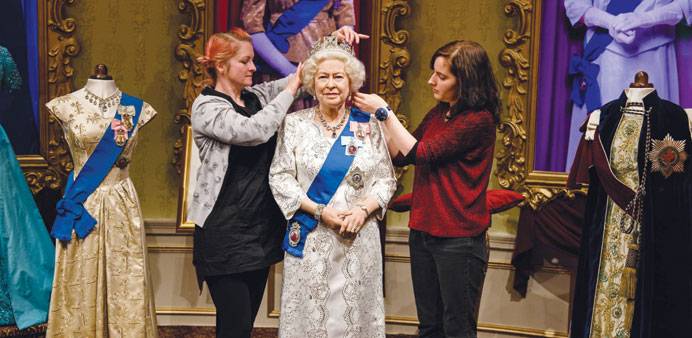AFP/London
Queen Elizabeth II is planning to keep things low-key tomorrow when she will overtake Queen Victoria as Britain’s longest-serving monarch, despite public interest in the historic date.
The Queen will ride on a steam train in Scotland to inaugurate a new railway line and will host a dinner at Balmoral Castle with her grandson Prince William and his wife Kate in attendance.
According to calculations by royal officials, at around 1630GMT Elizabeth will beat her great-great grandmother Victoria’s time on the throne: a total of 63 years, seven months and two days which she served between 1837 and 1901.
The exact hour has been difficult to determine because the exact start of her reign - the moment when her father George VI passed away - is difficult to work out as the king died at night in his sleep.
The 89-year-old Elizabeth, also the world’s oldest monarch, had originally not planned anything special for the day itself but reportedly agreed to a public appearance due to public pressure.
“You need to remember for the Queen this is a date whose calculation rests on the death of her father and great-great grandmother. That naturally colours the way she sees it,” a royal source said.
“While she acknowledges it as an historic moment, it’s also for her not a moment she would personally celebrate, which is why she has been keen to convey business as usual, and no fuss,” the source said.
Buckingham Palace will mark the day with a photo display of her reign and the Royal Mint has designed a new silver £20 coin with the five official portraits since she became queen in 1952.
Historian David Starkey said the Queen’s style, inherited from her father King George VI, and grandfather King George V, had helped “established a record of unimpeachable integrity”.
He said her refusal to comment on controversial issues had deprived “republicanism of the necessary oxygen of controversy”.
However, it also meant she had “done and said nothing that anybody will remember” and she would therefore “not give her name to her age” as Victoria did, the historian wrote in the Radio Times.
By contrast, fellow historian Andrew Gimson argued that Elizabeth’s reign “will be seen as an incredible accomplishment,” spanning a period “marked by many major social and economic changes”.
These changes saw Britain’s global influence, which peaked during Victoria’s reign, diminish as the empire gave way to independence.
It was a process already under way when Elizabeth came to the throne, as the country was rebuilt after the trauma of World War II.

Stylists Jane Anderson (left) and Luisa Compabassi pose with the re-styled wax figure of Queen Elizabeth II during a photocall at Madame Tussauds in c
